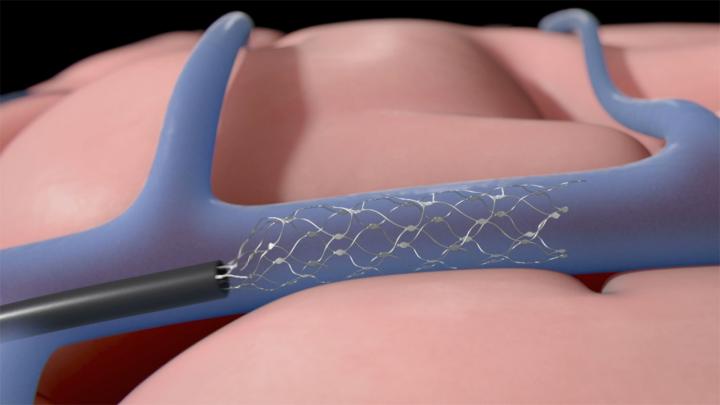
Credit: Synchron
The Stentrode™ is a device that is placed inside a blood vessel of the brain located in an area that controls movement (motor cortex). It is the only investigational technology of its kind that does not require open brain surgery.
Once implanted, the Stentrode™ picks up signals and transmits the signals to artificial intelligence software that could help a person communicate or control a computer.
Five patients with a range of conditions including spinal cord injury, stroke, muscular dystrophy, or motor neuron disease, including amyotrophic lateral sclerosis (ALS) will be recruited to trial the device.
The Royal Melbourne Hospital’s Professor Peter Mitchell, Director, Neurointervention Service and principal investigator on the trial, said the real-world effect of this technology is that it will benefit people who are locked into their bodies, who have almost no physical function and can’t speak.
“If this trial can successfully provide a brain-to-computer interface, it would allow people with these kinds of injuries and diseases to communicate – this would be amazing,” Professor Mitchell said.
“In particular, motor-neuron disease sufferers as well as other patients with severe paralysis may see some benefits such as being able to control a mouse or keyboard through the use of this device. This would give people back a small amount of independence.”
The purpose of this research is to find out if the use of the Stentrode device is safe in humans as well as assess the stability of high-fidelity signals from the brain to external communications technologies.
The research is being supported by Synchron Pty Ltd, an Australian Neurotechnology Company.
Stentrode™ creator and CEO of Synchron, Associate Professor Thomas Oxley, MD, PhD, and Neurointerventionalist, said research has shown that, in individuals with neurological conditions leading to paralysis, brain signals can be recorded using electrical sensors implanted in the brain.
“These signals could be used by the individuals to control assistive technology (e.g. personal computer, text generation, smart environment, mobility assist devices) that help with daily life, just by thinking and directly controlling special software,” A/Prof Oxley said.
“We have been able to create the world’s only minimally-invasive device that is implanted into a blood vessel in the brain via a day procedure, avoiding the need for high-risk open-brain surgery.
“This research may help us find safer and more effect ways to introduce electrical sensors to patients. This could help the development of more user-friendly biotechnology for patients with neurological conditions. It may also help to better understand how the human brain works in general,” said A/Prof Oxley.
###
The trial will take place in Melbourne, Australia at The Royal Melbourne and Bethlehem Hospitals from mid-2019. For more information contact visit https:/
Media Contact
Rose Houghton
[email protected]




